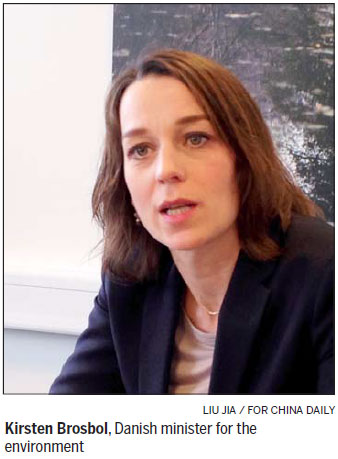China and Denmark drink from same glass on water
On eve of World Water Forum, Danish environment minister stresses collaboration
The Danish and Chinese pavilions are expected to opposite each other at the 7th World Water Forum in South Korea from April 12 to 17.
The proximity hopefully will not be one just of physical distance, but also in terms of joint collaboration between the countries on water issues, says Denmark's Environment Minister Kirsten Brosbol.
The forum Daegu and Gyeongbuk aims to boost international collaboration in finding solutions to water problems facing many nations.
Brosbol calls Denmark's relationship with China very strong and close in general, stressing that it is so "in the environmental field in particular".
The countries have a long-term partnership in wind energy, she says. "But besides wind, water is another main area where we cooperate intensively, and I see a great potential there."
During her visit to China in September, Brosbol signed an agreement for Sino-Danish action until 2018 in water resources with her Chinese counterpart, Chen Lei, minister of water resources. Brosbol, 37, assumed her duties just over a year ago.
"We further developed specific lines where we want our cooperation to go within the water sector, and we agreed particularly to build water facilities and utilities in China using Danish technologies," she says.

Officials of the Chinese Ministry of Water Resources say the country is confronted with the challenges of a large population, limited water resources and deteriorating water quality, especially with rapid urbanization and industrialization.
"It is an opportunity for Denmark because we indeed have some strengths and experiences within the field where we can contribute to solving these challenges in the world," Brosbol says.
Since 1980, the Danish economy has grown 80 percent while its energy consumption has remained the same, and its water consumption has dropped nearly 40 percent.
The Danes, surrounded by water, have a long tradition of farsighted and stringent environmental legislation combined with targeted investment in research and development.
Denmark has developed comprehensive knowledge, expertise, technologies and solutions in areas such as flood warnings, water distribution efficiency, water loss minimization, groundwater protection and wastewater treatment and reuse.
"We began the journey in the 1960s, and now we still have challenges," Brosbol says. "One of our keys to success is strong public-private partnerships."
In Denmark there are numerous public utilities working with private businesses to exploit new technologies, enabling Danish businesses to export technologies and solutions around the world, she says.
Instead of avoiding the transfer of its advanced technologies, Brosbol considers it a win for both sides if the businesses of two countries develop and share technologies in close concert.
"That's what I heard from our businesses, that they are willing to cooperate with China also on technology, because in the future it will be mutually beneficial," says Brosbol, adding that research and development collaboration between universities is of high value, too.
Participants from Denmark participating in their country's pavilion in South Korea include companies and educational institutions - AVK, Grundfos, DHI, Danfoss, the Technical University of Denmark and Danish Water Forum, says Iver Hoj Nielsen, a spokesman for State of Green, a nonprofit public-private partnership founded by the Danish authorities and the co-organizer for Denmark's pavilion.
Brosbol is also set to participate in in-depth discussions at the forum participants from more than 150 countries.
Her last visit to China is bearing fruits, she says, but she is expecting more progress this year on the occasion of the 65th anniversary of bilateral diplomatic relations.
"In May we will have a celebration here in Denmark where I also expect to receive a high-level delegation from China, probably headed by the Chinese ministers."
In addition, the fourth high-level meeting of the China Europe Water Platform will be held in Copenhagen next month. The event was launched in 2012 by the Chinese Ministry of Water Resources and the presidency of the Council of the European Union, represented by Brosbol's predecessor Ida Auken, at the last World Water Forum in France.
"So there will be a great occasion to renew our cooperation," Brosbol says. "Hopefully I will host Minister Chen Lei in Denmark this May," she says, referring to the minister of water resources.
Brosbol says she hopes there will be additional chances to work together on water issues under the Silk Road Economic Belt and 21st Century Maritime Silk Road initiatives launched by President Xi Jinping's administration. The initiatives would tie China closer to other countries in Asia, as well as to East Africa, the Middle East and Europe.
The United Nations forecasts that global water consumption will rise 30 percent by 2030 due to population growth and increasing wealth. At the same time, water shortages pose a severe challenge to many countries, including China.
For China Daily


















